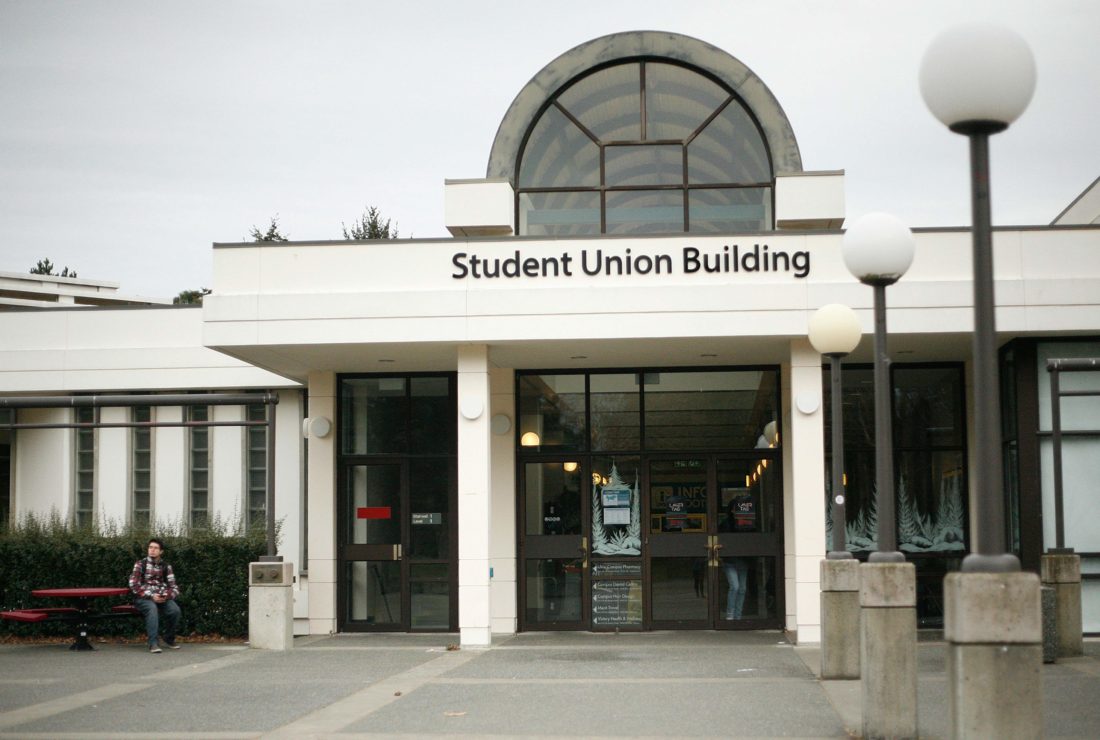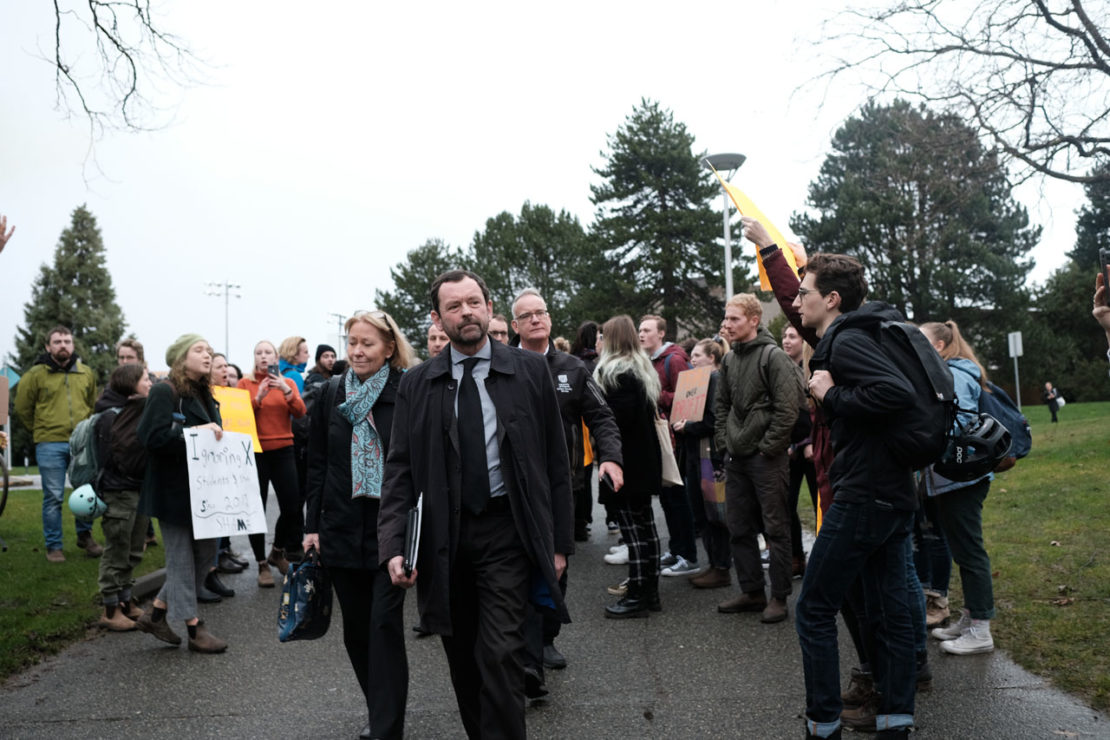Your guide to the people that decide how your tuition and fees are spent

Have you ever wondered who decides tuition? Or what the UVSS actually does? Whether you are new to UVic or are a returning student, it is important to know how your institution works, who represents you, and who to hold accountable. The Martlet dug into all these questions and more to help you understand your school a little better.
Student groups and societies
University of Victoria Students’ Society, advocacy groups, and the Graduate Students’ Society
The University of Victoria Students’ Society (UVSS) is the main student-run organization on campus. It represents UVic’s over 18 500 undergraduate students through lobbying efforts, operates the Student Union Building (SUB), administers the bus pass and health plan, hosts events like Campus Kick-Off, oversees clubs and course unions, and organizes campaigns like Divest UVic. The UVSS’ budget of $15.5 million comes from your student fees and other sources of revenue — like income from SUB businesses.
An elected board of directors governs the UVSS. The board consists of 17 elected directors, student advocacy reps, four appointed administrators, and a representative from the Native Students’ Union (NSU).
There are five paid lead directors. Each lead director has a portfolio. This year, Caleb Burd is the Director of Finance and Operations, Dalal Tubeishat is the Director of Student Affairs, Sebastian Franco-Monroy is the Director of Events, Sarina de Havelyn is the Director of Outreach and University Relations, and Emily Lowan is the Director of Campaigns and Community Relations.

Much like how municipal governments function, these directors are tasked with coming up with strategic objectives for their portfolios, which will then be carried out in collaboration with administrators and volunteer directors-at-large. The 11 directors-at-large also sit on committees to both scrutinize and assist lead directors with their tasks.
Lastly, the board includes an international student representative, a representative from the Native Students’ Union (NSU), and student representatives from the four main advocacy organizations affiliated with the UVSS: The Gender Empowerment Centre (GEM), Society for Students with a Disability (SSD), Students of Colour Collective (SOCC), and UVic Pride. Marina Muir is the current GEM representative, Natalie Blecha maintains her position as the SSD representative, Gina Tran is the SOCC representative, and the UVic Pride representative position is currently vacant.
The UVSS board is elected annually in the spring and any student can run. In the past, students have run in slates, almost like political parties. Now, students can run in cooperatives — groups that share finances and a campaign manager, but are not allowed to mention their cooperative name or the names of other candidates running with them. In October, students will vote for a DaL for the one open position. There are also upcoming referendums on VIPIRG funds and open educational resources (OERs).
Undergraduate students pay UVSS membership fees as part of their tuition. Fees are $76.85 per semester for full-time students and $38.39 per semester for part-time students.
Students can show up (now, virtually) at UVSS meetings to see where their money goes, get involved with campaigns such as Divest UVic, and advocate for the board to lobby the university on specific issues. The Martlet also tweets the main highlights from every UVSS meeting live.
Graduate Students’ Society
Graduate students have their own students’ society as well, known as the Graduate Students’ Society (GSS). The GSS operates the Halpern Centre for Graduate Students which includes the Gradhouse Restaurant, and the Side Project coffeehouse. The centre also holds the GSS offices. The GSS administers its own healthcare plan and bus pass for graduate students, as well as supports for grad students including guidance on student-supervisor relationships.
UVic administration
Board of Governors

The Board of Governors serves as the overarching governing body of the university. It is responsible for dealing with the building, repair, and management of buildings; the setting of tuition, investments, salaries, and other fees; the appointment of all staff of the university, including professors, librarians, and the president upon recommendation from senior administrative officials in those departments; and the establishment of university regulations and bylaws.
The Board of Governors has 15 members. The chancellor and the president head the board. Two members are nominated by faculty. Eight are appointed by the Lieutenant Governor, two of which are recommendations by the university’s alumni association. One member is elected by the employees of the university and must not be a member of faculty. Lastly, two members are students, either graduate or undergraduate, elected by the student body. Except for the two student representatives, who are elected yearly, and the president and chancellor, all members of the Board of Governors serve for three-year terms.
Students can engage with the Board of Governors by attending meetings, raising issues with the UVSS and asking them to lobby members of the board, or engaging directly with the board’s student representatives. The Martlet also live tweets all Board of Governors meetings.
Senate
Whereas the Board of Governors is responsible for overall governance of the university, the Senate is purely responsible for academic affairs. The Senate recommends the establishment or discontinuation of degree or certificate programs and the creation and management of awards and bursaries. It also sets requirements for graduation, qualifications for faculty members, student discipline, and curriculums.
UVic’s 72-member Senate is chaired by the president and also includes the chancellor, the provost, the deans of all faculties, the head librarian, the director of continuing education, 32 faculty members with at least two from each faculty, 16 students, four members from the convocation who are elected by that body, the secretary of the Senate, and three additional members. Every non-student member of the board serves for three years in their positions while student members are elected annually.
As with the Board of Governors, students can engage with the Senate through attending meetings and by raising issues with either the UVSS or the Senate student representative from their faculty.
The president
While the chancellor is the ceremonial head of the university, it is the president that holds the most decision-making power. The president is responsible for shaping the overall strategic direction of the university, including on investments, faculty hiring, faculty firing or suspension, and student discipline. The president makes recommendations to the Board of Governors, and is responsible for developing relationships with stakeholders and other post-secondary institutions.
The president chairs the Senate and serves as a member of the Board of Governors. The president is appointed by the Board of Governors with approval of the Senate following the results of a search committee made up of students, faculty, alumni, and senior leaders. A president’s term is five years.
UVic’s current president, Jamie Cassels, has been in the role since July 1, 2013, but will be replaced by Kevin Hall on Nov. 1. Hall joins UVic from the University of Newcastle in Australia where he served as the Senior Deputy Vice-Chancellor of Global Engagement and Partnerships. Hall is a civil engineer by trade and researches water quality modelling, environmental monitoring, pathogen-detection systems, and water and health in marginalized communities.
The chancellor
The chancellor serves as the ceremonial head of the university and is responsible for signing and granting degrees. The chancellor serves as a member of both the Board of Governors and the Senate and thus has a say in university decision-making. The Chancellor is nominated by the alumni association and appointed by the Board of Governors in consultation with the Senate and serves for a three-year term. The chancellor cannot hold their position for more than two terms.
Our current chancellor is Shelagh Rogers, a veteran broadcast journalist for the CBC and the current host of CBC’s The Next Chapter radio program. Rogers has held the position since Jan. 1, 2015.
The executive
Members of the executive serve under the president. They are responsible for the running of the university based on decisions made by the Board of Governors and the Senate and make the final say on decisions in their departments. There are five senior executives: vice-president academic and provost, vice-president research, vice-president finance and operations, vice-president external relations, and university secretary. Members of the executive are nominated by a search committee and appointed by the Board of Governors.
To sum it all up, the Board of Governors makes most of the administrative decisions with the President and his Vice-Presidents oversee implementation and provide leadership to the UVic’s various departments. The Senate, meanwhile, oversees UVic’s academic direction and recommends decisions in certain areas to be approved by the Board of Governors. The UVSS is responsible for the student experience at UVic outside of academics and for lobbying the Board of Governors and the Senate on issues such as tuition and textbooks.







